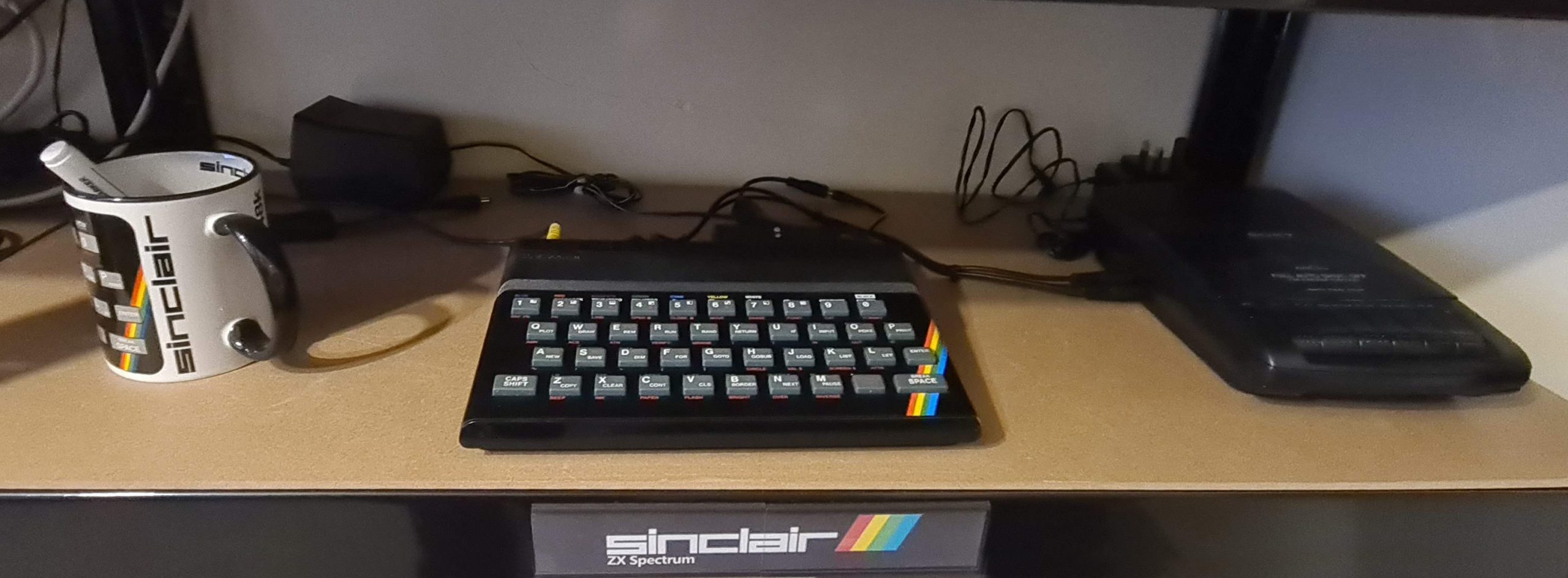ZX SPECTRUM 48K
The ZX Spectrum is an 8-bit home computer that was developed by Sinclair Research. It was released in the United Kingdom on 23 April 1982, and became Britain’s best-selling microcomputer.
Referred to during development as the ZX81 Colour and ZX82, it was launched as the ZX Spectrum to highlight the machine’s colour display, which differed from the black and white display of its predecessor, the ZX81.
History
I do not recall ever owning a ZX Spectrum as I had other computers at the time and the was a healthy rivalry between manufacturers, and I did not have unlimited funds to have one of every type of machine.
I felt, however, in retrospect that no retro room would be complete without the one and only ZX Spectrum, so I have added one to my collection.
I have, where possible, future proofed it and using todays technology to replace tapes for SD cards, removed weak links in the design such as the heat sink issue and it has been composite modded for modern displays.
EBAY LISTING:
Sinclair ZX Spectrum 48k. Condition is “Used”.
Fully refurbished Issue 3B 48k rubber key Sinclair ZX Spectrum. Serial No 011-820065
Composite modification has been done.
Sony TCM 939 tape cassette player in full working order.
Selection of classic games.
Horizons Software Starter cassette.
ZX Basic programming guide.
Introduction booklet.
Sinclair ZX Spectrum – A Visual Compendium Book.
New keyboard membrane and faceplate.
All electrolytic capacitors replaced
Internal speaker replaced
Ear and mic sockets tightened and tested
Full diagnostic test of RAM
The power supply is an origina.
Includes all required power adapters and cables
ACCESSORIES & UPGRADES
ACCESSORIES
&
UPGRADES
DIAGNOSTIC CARTRIDGE
ZX Spectrum Diagnostic board
Loaded with 3 diagnostic ROM’s (Dylan Smith’s original 48k & 128k ROM v0.1, and Brendan Alford’s ROM v0.38)
LED output on the diagnostic board will assist in locating faulty RAM chips on the Spectrum.
The Diagnostic board has been configured as follows:
Page 0 – Dylan’s diagnostic 48k ROM v0.1
Page 4 – Flash utility
Page 5 – Brendon’s diagnostic ROM v0.38
Page 6 – Dylan’s diagnostic 48k ROM v0.1
Page 7 – Dylan’s diagnostic 128k ROM v0.1
When page jumper 1-2 is selected the board will boot from page 0
DIAGNOSTIC CARTRIDGE
ZX Spectrum Diagnostic board
Loaded with 3 diagnostic ROM’s (Dylan Smith’s original 48k & 128k ROM v0.1, and Brendan Alford’s ROM v0.38)
LED output on the diagnostic board will assist in locating faulty RAM chips on the Spectrum.
The Diagnostic board has been configured as follows:
Page 0 – Dylan’s diagnostic 48k ROM v0.1
Page 4 – Flash utility
Page 5 – Brendon’s diagnostic ROM v0.38
Page 6 – Dylan’s diagnostic 48k ROM v0.1
Page 7 – Dylan’s diagnostic 128k ROM v0.1
When page jumper 1-2 is selected the board will boot from page 0
POWER CONVERTER
This is used to change from the installed power coverter on the motherboard whic produces alot of heat which can damage the computer components.
By installing this component the heat is removed, which means the computer no longer neads the large heatsink plate.
ROUND IC SOCKET
Round IC Socket
all 2.54mm (0.1″) Pitch
Wide and Narrow models
After removing CPU with M1 issue, installed this IC socket to be used by replacement CPU
ZX SPECTRUM POWER SWITCH
Looking for a perfect solution for an inline switch for your humble speccy
Look no further this switch will save your speccy’s power socket an ensure stability and increased reliability
Summary
Once the Spectrum arrived, I future proofed it by upgrading the Power Converter which reduces the amount of heat produced.
After purchasing the DIV MMC cartridge, it demonstrated I had the M1 issue with the processor, so I removed the old processor, installed a chip socket and replacement CPU and now everything works as it should.
ZX Spectrum 48k with Tape Drive
Diagnostic Cartridge
PSU Button Cable
DIV MMC Card Drive
M1 CPU Replacement
Summary
Once the Spectrum arrived, I future proofed it by upgrading the Power Converter which reduces the amount of heat produced.
After purchasing the DIV MMC cartridge, it demonstrated I had the M1 issue with the processor, so I removed the old processor, installed a chip socket and replacement CPU and now everything works as it should.









